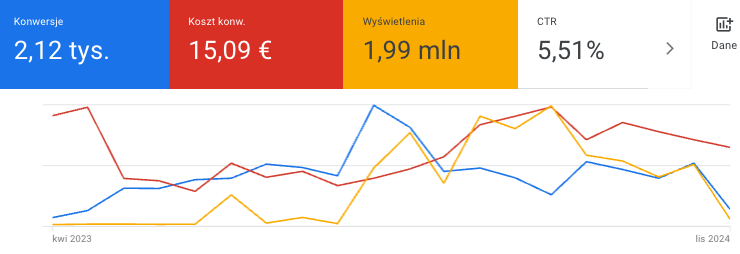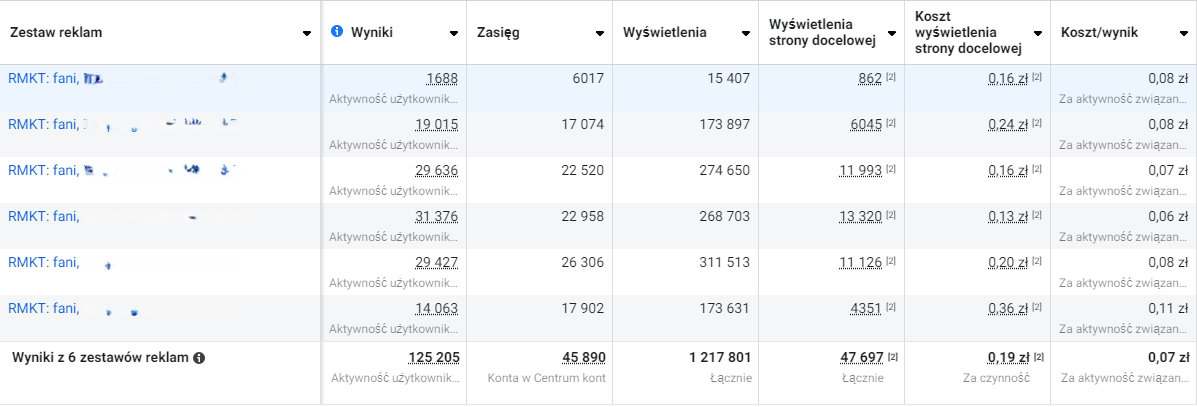In today's rapidly developing digital world, online advertising has become one of the main tools supporting business development. Regardless of the industry, companies are increasingly deciding to invest in advertising campaigns to increase their recognition, reach new customers and strengthen their position on the market. However, for the campaign to be effective, it is important that it is properly planned and adapted to the specifics of a given industry.
In this article, we will look at how advertising campaigns can support business development, using specific examples from different industries, presented in our case studies. We will see how marketing activities in different sectors – legal, education, publishing and construction – can translate into real business results.
Advertising campaigns – why are they worth it?
Every company, regardless of size, should consider investing in advertising campaigns. The advantage of such activities is the ability to reach a precisely defined group of recipients, which increases the effectiveness of the campaign and allows for effective management of the advertising budget.
Benefits of advertising campaigns this includes:
- Increased brand recognition: Advertising campaigns help you reach a wide audience that can learn about your brand and what it has to offer. This is especially important when you are just starting out, but also when you want to reach new markets.
- Acquiring new customers: With properly planned campaigns, you can reach people who need your products or services at the moment, which increases the chances of conversion.
- Building brand trust: Good advertising campaigns, based on transparent communication and relevance of the offer, help build lasting relationships with customers.
The effectiveness of advertising campaigns is not based solely on general goals. It is worth remembering that, depending on the industry, campaigns must be tailored to the specific needs and expectations of recipients. Let us now take a look at how KomuKoncept campaigns have influenced the development of businesses from various industries.
Why is measuring campaign success crucial?
Measuring the results of advertising campaigns allows you to assess whether marketing goals have been achieved, what aspects need improvement, and what elements performed best. Without thorough analysis, marketing activities can be just guesswork, not conscious optimization.
Advertising campaign goals
Every advertising campaign should be based on specific goals. The most common goals are:
- Increased brand awareness – increasing the number of people who recognize the brand.
- Lead generation – obtaining contact information from potential customers.
- Increased sales – direct increase in the number of transactions.
- Customer loyalty – retaining regular customers and increasing their engagement.
Defining the goal is crucial because it allows you to select appropriate success indicators, which will then be analyzed.
Key Performance Indicators (KPIs)
To measure success, you need to define appropriate performance indicators (KPIs). The most commonly used are:
- CTR (Click Through Rate) – click-through rate, which indicates how many people clicked on the ad in relation to the number of its displays.
- CPC (Cost Per Click) – cost per click on the ad, which allows you to assess the effectiveness of your expenditure.
- Conversion Rate – conversion rate, i.e. the percentage of people who performed the desired action after clicking on the ad (e.g. purchase, newsletter subscription).
- CPA (Cost Per Acquisition) – customer acquisition cost, i.e. the amount spent on the campaign per customer acquisition.
Campaign optimization based on results
The key to success is not only measuring results, but also analyzing them and using this data to optimize campaigns. It is worth keeping up to date:
- Test different versions of ads (A/B testing).
- Analyze traffic sources and respond to changes in user behavior.
- Adjust budget and targeting to the results achieved.
Performance-based optimization allows you to achieve increasingly better results, increasing your campaign ROI.
Examples of campaigns from different industries
KomuKoncept has experience in running advertising campaigns for companies from various sectors, which allows it to adapt its activities to the specific needs of its clients. Here are a few examples that show how different industries can benefit from properly planned online advertising:
Legal Industry: B2B Lead Campaign for an International Law Firm

For one of its clients operating in the legal industry, KomuKoncept prepared an advertising campaign aimed at acquiring B2B leads. The aim of the campaign was to reach companies that needed legal support at an international level. The focus was on the use of precise targeting and appropriate messages that responded to the needs of specific companies.
Campaign Results: Thanks to the appropriate selection of the target group and effective advertising optimization, the campaign allowed the acquisition of high-quality leads, which had a significant impact on the client's further business development.
See the full case study: B2B Lead Campaign for an International Law Firm.
Education Industry: Lead Campaign for a B2B Education Client

In the education industry, the ability to reach decision-makers who are responsible for selecting educational service providers plays a special role. KomuKoncept created an advertising campaign aimed at reaching educational companies and training institutions offering courses and training for companies. A key element of the campaign was the personalization of messages, which were tailored to the individual needs of recipients.
Campaign Results: The campaign successfully generated valuable leads, which allowed the client to further develop and strengthen its position in the educational services market.
See the full case study: Lead campaign for a client from the B2B education sector.
Publishing Industry: Marketing campaign for a publishing client

KomuKoncept also prepared an advertising campaign for a publishing company, the aim of which was to increase sales of magazine subscriptions. The campaign was aimed at people interested in regular access to content, and the aim was both to increase the number of subscribers and to raise awareness of the client's publishing offer.
Campaign Results: The campaign brought a significant increase in the number of subscriptions and also allowed for the acquisition of new groups of recipients. The effectiveness of the campaign was possible thanks to the carefully selected communication channels and understanding the needs of the target group.
See the full case study: Marketing campaign for a client from the publishing industry.
Construction Industry: B2B Lead Campaign for the Construction Industry

For a client from the construction sector, KomuKoncept conducted a lead campaign aimed at acquiring valuable B2B partners. The campaign focused on reaching construction companies that needed services in the field of building materials, technology and design support. An important element of the campaign was precise targeting and the use of messages adapted to the specifics of the construction sector.
Campaign Results: The campaign brought significant results in the form of new partnerships and had a positive impact on the development of the client's business.
See the full case study: B2B lead campaign for the construction industry.
Conclusions and recommendations
As the presented case studies show, effective advertising campaigns have a common denominator: proper planning of activities and precise matching of messages to the specific needs of the industry and recipients. Regardless of whether the goal is to acquire B2B leads, increase subscription sales or reach new business partners - the key to success is segmentation and precise targeting of recipients.
Recommendations:
- Tailor your campaign to your industry specifics: Every sector has its own unique needs, and an effective advertising campaign takes these differences into account.
- Focus on the quality of your leads, not just their quantity: Many companies make the mistake of focusing only on acquiring as many leads as possible. It is important that they are valuable and tailored to business needs.
- Measure campaign results: Regular analysis of the effectiveness of advertising activities allows for campaign optimization and better budget management.
Contact us
Schedule a free consultation:

Aleksandra Dzwierzyńska
Head of Social
ola@komukoncept.pl

Michal Opydo
Managing Director
michal@komukoncept.pl
- Written by: Michal Opydo
- Posted on: 3 lut 2025
- Tags: google ads, Marketing, Facebook advertising, Social Media

